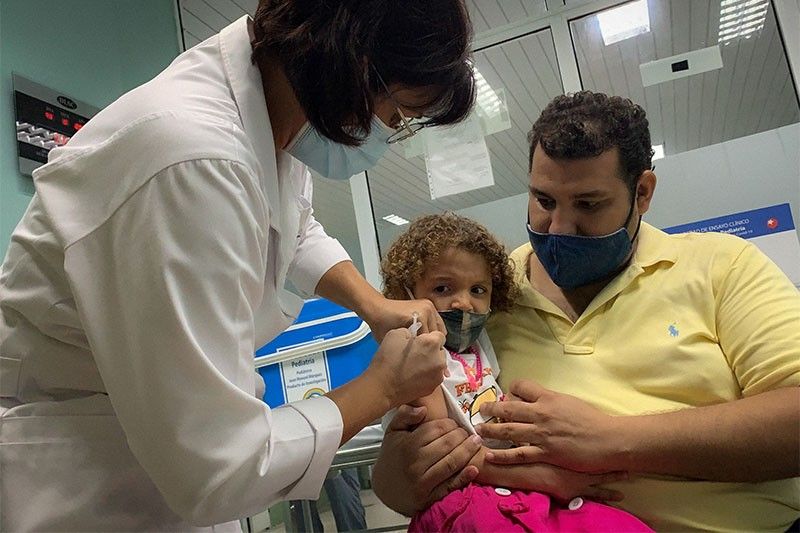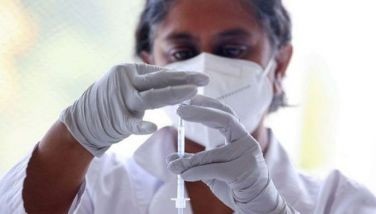In world first, Cuba starts COVID-19 jabs for toddlers

HAVANA, Cuba — Cuba on Monday became the first country in the world to vaccinate children from the age of two against Covid-19, using home-grown jabs not recognized by the World Health Organization.
The communist island of 11.2 million people aims to inoculate all its children before reopening schools that have been closed for the most part since March 2020.
The new school year started on Monday, but from home via television programs, as most Cuban homes do not have internet access.
Having completed clinical trials on minors with its Abdala and Soberana vaccines, Cuba kicked off its inoculation campaign for children on Friday, starting with those 12 and older.
On Monday, it started distributing jabs in the 2-11 age group in the central province of Cienfuegos.
Several other countries in the world are vaccinating children from the age of 12, and some are conducting trials in younger kids.
Countries such as China, the United Arab Emirates and Venezuela have announced they plan to vaccinate younger children, but Cuba is the first to do so.
Chile on Monday approved the Chinese Sinovac vaccines for children between six and 12.
The Cuban vaccines, the first developed in Latin America, have not undergone international, scientific peer review.
They are based on recombinant protein technology -- the same used by the United States' Novavax and France's Sanofi jabs also awaiting WHO approval.
Unlike many other shots in use, recombinant vaccines do not require extreme refrigeration.
The majority of schools in Cuba have been closed since March 2020, reopening for a few weeks at the end of last year before closing again in January.
The government has announced schools will reopen gradually, in October and November, but only after all children have been vaccinated.
UN agency UNICEF has called for schools worldwide to reopen as soon as possible, as "the long-term costs of closures are too high and hard to justify."
Cuba has seen an explosion in coronavirus infections in recent months, putting pressure on its health system.
Of the 5,700 coronavirus deaths recorded since the outbreak started, nearly half were in the last month alone, as were almost a third of all reported cases.
Pharma giants Sanofi and GSK said on July 29, 2020, that they have agreed to supply Britain with up to 60 million doses of a potential COVID-19 vaccine. The agreement covers a vaccine candidate developed by France's Sanofi in partnership with the UK's GSK and is subject to a "final contract."
This thread collects some of the major developments in the search for a vaccine to ease the new coronavirus pandemic. (Main photo by AFP/Joel Saget)
As negotiations towards a new pandemic treaty pick up pace, observers warn of watered-down efforts to ensure equitable access to the medical products needed to battle future Covid-like threats.
Shaken by the pandemic, the World Health Organization's 194 member states are negotiating an international accord aimed at ensuring countries are better equipped to deal with the next catastrophe, or even prevent it altogether.
The process is still in the early stages, with the aim of reaching an agreement by May 2024.
But critics warn that revisions being made to the preliminary negotiating text are weakening the language -- notably in a key area aimed at preventing the rampant inequity seen in access to vaccines and other medical products during the Covid pandemic.
"I think it is a real step backwards," Suerie Moon, co-director of the Global Health Centre at the Geneva Graduate Institute, told AFP. — AFP
Africa's first mRNA vaccine hub is ceremonially launched on Thursday to acclaim from the UN's global health chief, who hailed it as a historic shift to help poor countries gain access to life-saving jabs.
The facility was set up in the South African city of Cape Town in 2021 on the back of the success of revolutionary anti-Covid vaccines introduced by Pfizer/BioNTech and Moderna.
"This precious project... will bring a paradigm shift in addressing the serious problem we faced, the equity problem, during the pandemic, so (that) it's not repeated again," World Health Organization (WHO) head Tedros Adhanom Ghebreyesus tells a media briefing to mark the inauguration. — AFP
China has approved its first locally developed messenger RNA (mRNA) vaccine against Covid-19, its manufacturer said Wednesday, months after the relaxation of strict Covid-zero regulations sparked a surge in cases.
The vaccine, developed by CSPC Pharmaceutical Group Ltd, has been approved for "emergency use" by Beijing's health regulator, the company said in a statement.
It showed high efficacy in a trial in which it was used as a booster shot for people who have been given other types of vaccines, the company added, without offering further details. — AFP
COVID-19 vaccine maker Novavax raises doubts about its ability to continue its business, announcing plans to cut spending after struggles in rolling out its coronavirus jab.
Shares of Novavax plummeted 25 percent in extended trading, after the company reported fourth-quarter earnings that missed analyst estimates.
While the firm should have enough money to fund operations, the situation is "subject to significant uncertainty," it says in a statement. — AFP
The protection against Covid-19 from being previously infected lasts at least as long as that offered by vaccination, one of the largest studies conducted on the subject says.
Ten months after getting Covid, people still had an 88% lower risk of reinfection, hospitalisation and death, according to the study published in the Lancet journal.
That makes this natural immunity "at least as durable, if not more so" than two doses of Pfizer or Moderna's vaccines, the study says.
The authors nevertheless emphasized that their findings should not discourage vaccination, which remains the safest way to get immunity. — AFP
- Latest
- Trending




























